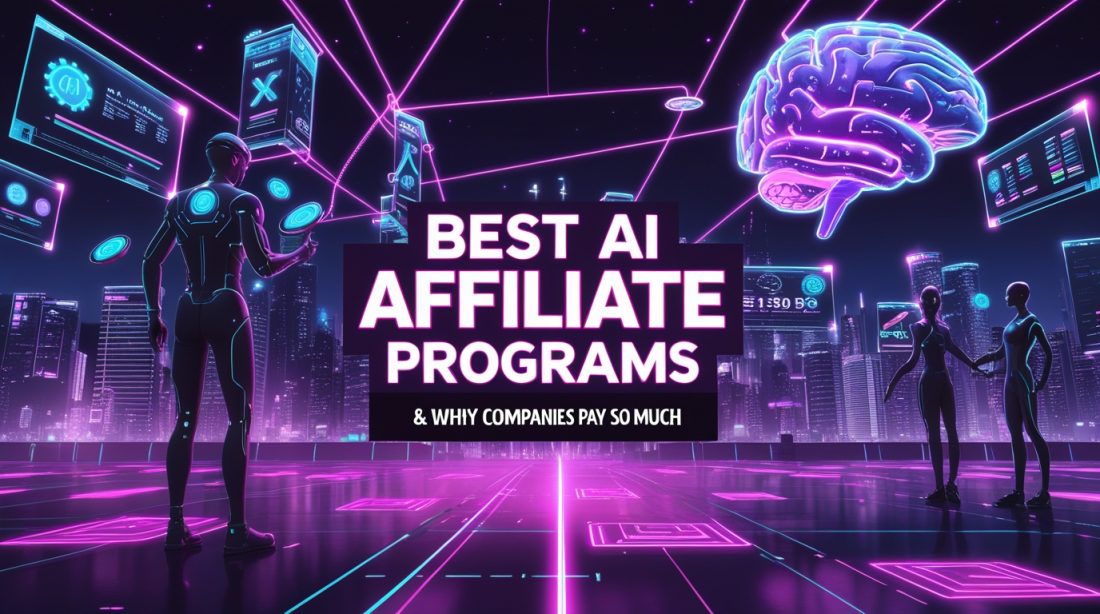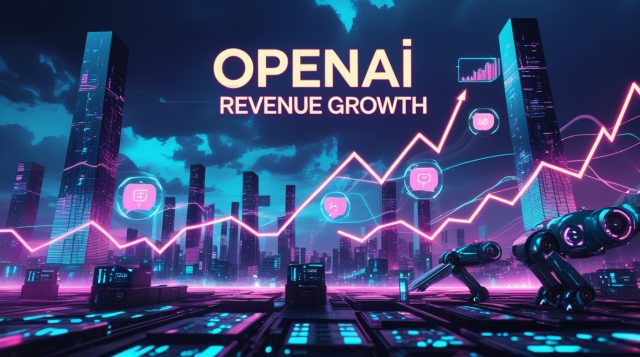The global generative AI market is expected to balloon from $40 billion in 2022 to $1.3 trillion over the next decade. In this gold rush, the real money isn’t just in building AI—it’s in deploying it.
The artificial intelligence landscape has become a competitive battlefield in 2025. With new models and tools launching weekly, AI firms face a critical challenge: building technology is only half the battle; getting it deployed at scale is the real war.
This is where affiliate commissions for AI deployment have emerged as a powerful strategic weapon. Rather than relying solely on traditional sales teams, forward-thinking AI companies are leveraging partner ecosystems to drive adoption, creating a symbiotic relationship that fuels the entire industry. It’s why discussions around best AI affiliate programs and why companies pay so much are gaining momentum—because affiliates are quickly becoming central to scaling AI across sectors.
Why Market Expansion Drives AI Affiliate Program Adoption
In the relentless race for AI dominance, companies discover that their in-house sales teams can only reach so far. Each vertical market—healthcare, finance, e-commerce, manufacturing—has unique pain points, jargon, and operational workflows that require specialized knowledge to navigate effectively.
Industry-specific affiliates solve this market penetration problem organically. A digital marketing agency that already serves e-commerce brands can seamlessly introduce AI copywriting tools like Jasper or Writesonic to their clients, complete with real-world implementation guidance. Similarly, a healthcare IT consultant can help deploy AI-powered patient referral optimization systems in hospital networks, ensuring the technology addresses specific clinical workflows. For instance, tools like those discussed in how AI-driven scientific discovery is transforming critical challenges in modern research highlight how specialized AI applications can address niche industry needs with precision.
AI isn’t just cool—it’s lucrative, and the market is only getting hotter, notes one industry analysis from Forbes, highlighting why affiliates are rushing to promote these tools. For AI firms, each affiliate partner effectively becomes an extension of their sales force, but with pre-established trust and credibility in niche domains that would otherwise take years to develop.
Why Customer Acquisition Costs Make Affiliate Programs Strategic
Traditional enterprise sales processes for AI solutions are notoriously expensive. Lengthy sales cycles, multiple stakeholder approvals, custom demonstrations, and security reviews all contribute to customer acquisition costs (CAC) that can cripple growth-stage companies.
AI affiliate programs fundamentally rewrite this economics. Instead of maintaining large, costly sales teams, companies can implement performance-based partnerships where commissions are paid only on actual conversions. This performance-based model aligns perfectly with the lean operational principles that tech startups prize. The approach mirrors strategies seen in industrial AI analysis to boost efficiency in 2025 factories, where cost-effective solutions drive scalability.
Consider the math: A typical AI affiliate program might offer 20-30% recurring commissions for the lifetime of a customer. While this seems substantial, it pales compared to the 50-100% of first-year revenue that traditional enterprise sales can cost when accounting for salaries, commissions, and support resources.
This efficient customer acquisition strategy is precisely why platforms like GetResponse offer 40-60% recurring commissions for 12 months, and CustomGPT.ai provides up to 20% recurring commissions for two years. They recognize that affiliates driving qualified leads are far more cost-effective than pouring endless dollars into digital ads or maintaining oversized sales teams.
Why Trust and Credibility Determine AI Deployment Success
Unlike simple consumer products, enterprise AI deployment requires significant trust. Businesses aren’t just purchasing software—they’re integrating intelligence into their core operations, with all the associated risks around data security, implementation failure, and workflow disruption.
This trust economy creates a formidable barrier for AI companies, particularly newer entrants without established brand recognition. Case in point: A 2024 report revealed that fewer than 10% of U.S. companies actively use AI in their production processes, highlighting the gap between AI potential and actual deployment. This challenge is echoed in discussions about AI transparency risks and expert warnings in 2025, where trust remains a critical hurdle.
Affiliate marketers bridge this trust gap through established relationships and credibility with their audiences. When a respected industry influencer or specialized agency recommends an AI tool, their endorsement carries weight that no corporate advertisement can match.
Companies that have successfully adopted AI demonstrate several key characteristics: their employees actively use AI tools in daily work, their workflows have been redesigned to maximize AI capabilities, notes an analysis from McKinsey on AI adoption challenges. Affiliates often provide the crucial implementation guidance that helps transition organizations from AI experimentation to genuine adoption.
Why Recurring Revenue Models Align with AI Business Goals
The subscription-based nature of most AI tools creates ideal conditions for affiliate partnerships. Unlike one-time product sales, SaaS AI products generate predictable monthly or annual revenue, allowing for sustainable commission structures that benefit both companies and their affiliates.
This recurring revenue alignment transforms affiliate partnerships from transactional relationships into strategic alliances. When platforms like Text offer up to 22% lifetime recurring commissions, or Murf AI provides 20% recurring commissions for 24 months, they’re incentivizing partners to not just acquire customers, but to ensure those customers find lasting value in the product. This model aligns with trends in why robot subscription services are the next big revenue stream, where recurring revenue drives long-term partnerships.
The strategic beauty of this model is its built-in retention incentives. Affiliates who help clients successfully implement and derive value from AI tools are rewarded with ongoing commissions, creating a virtuous cycle where customer success directly benefits everyone involved.
Table: Best AI Affiliate Programs and Why Companies Pay So Much
| AI Platform | Commission Structure | Cookie Duration | Best For |
|---|---|---|---|
| GetResponse | 40-60% recurring for 12 months | 90 days | Email marketing automation |
| Writesonic | 30% lifetime recurring | 30-90 days | AI content generation |
| CustomGPT.ai | Up to 20% recurring for 2 years | 90 days | Custom chatbot development |
| Synthesia | 20-25% recurring for 12 months | 60 days | AI video generation |
| Surfer SEO | 25% recurring commission | 30 days | Content optimization |
Why Ecosystem Growth Creates Sustainable Competitive Advantage
Perhaps the most strategic reason AI firms embrace affiliate commissions lies in the ecosystem development that naturally follows successful partnerships. When affiliates integrate AI tools into their service offerings and client workflows, those tools become embedded in business processes in ways that create significant switching costs and network effects.
Consider a digital agency that builds its entire service offering around platforms like Jasper for content creation and Surfer for SEO optimization. Not only does this drive deployment of these specific tools, but it creates interdependencies that make the AI platform indispensable to the agency’s operations and profitability. This ecosystem approach is similar to the dynamics explored in the rise of the industrial AI data marketplace, where interconnected systems create lasting value.
This ecosystem effect generates what business strategists call “moats”—sustainable competitive advantages that are difficult for rivals to replicate. While features and pricing can be easily copied, established networks of implementation partners, integrated workflows, and shared customer relationships create barriers to entry that protect market leadership.
Furthermore, these ecosystems become innovation channels themselves. Affiliates often provide crucial product feedback, suggest new features, and identify untapped use cases that help AI companies refine their offerings and stay ahead of market needs. For example, Gartner notes that such feedback loops are critical for AI companies to stay competitive in fast-evolving markets.
The Strategic Future of AI Deployment
The aggressive adoption of affiliate commissions by AI firms represents far more than a marketing tactic—it’s a fundamental recognition that technology deployment, not just technology creation, determines market winners. As the AI industry matures, we can expect these partnership models to become increasingly sophisticated, with more nuanced compensation structures, better co-marketing support, and deeper technical integration opportunities.
For businesses considering AI adoption, these affiliate ecosystems provide valuable implementation support that reduces deployment risks. For AI firms, they offer scalable growth channels that simultaneously drive adoption while building defensive moats. And for affiliates, they create sustainable revenue streams in one of technology’s fastest-growing sectors—a true triple-win scenario powering the AI revolution.
FAQ
How do AI affiliate programs differ from traditional affiliate programs?
What makes AI products particularly well-suited for affiliate marketing?
AI tools often require demonstration and implementation guidance to overcome adoption barriers, which content creators and agencies can provide through tutorials, case studies, and hands-on support. This educational component aligns perfectly with the value-added approach of successful affiliate marketers .
How can I evaluate which AI affiliate programs to join?
Look for programs with transparent commission structures, competitive recurring rates, reasonable cookie durations, robust marketing support, and products that genuinely align with your audience’s needs. Programs like Text that offer 120-day cookies and lifetime recurring commissions provide sustained earning potential .
Do I need technical AI expertise to promote these tools effectively?
I’d love to hear from you ✨
What AI tools are you considering for your business? Which industries do you think are most ripe for AI disruption through affiliate partnerships? Share your thoughts – I read every response.
Subscribe to my newsletter for more analysis on the business of AI and emerging tech trends.
TL;DR: AI firms offer generous affiliate commissions because partners help them expand into new markets cost-effectively, build crucial trust with hesitant customers, create recurring revenue streams, and develop ecosystem advantages that are hard for competitors to replicate. These programs represent a strategic deployment channel, not just a marketing tactic.



